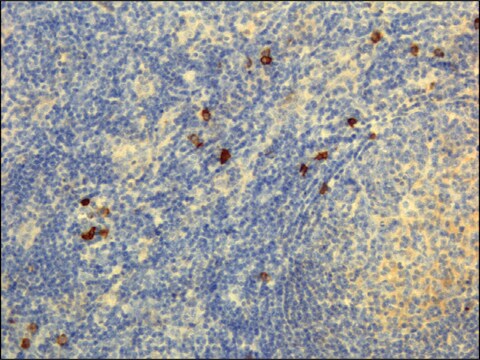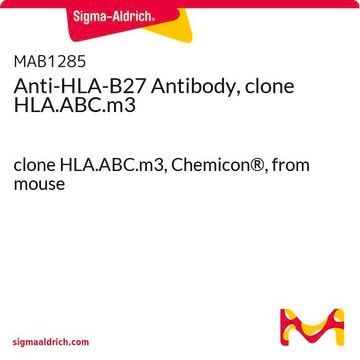Storage conditions are 2 to 8 °C; do not freeze. This can be found in the instructions for use (IFU).
367M-1
IgG4 (MRQ-44) Mouse Monoclonal Antibody
About This Item
Produtos recomendados
fonte biológica
mouse
Nível de qualidade
100
500
conjugado
unconjugated
forma do anticorpo
culture supernatant
tipo de produto de anticorpo
primary antibodies
clone
MRQ-44, monoclonal
descrição
For In Vitro Diagnostic Use in Select Regions (See Chart)
Formulário
buffered aqueous solution
reatividade de espécies
human
embalagem
vial of 0.1 mL concentrate (367M-14)
vial of 0.5 mL concentrate (367M-15)
bottle of 1.0 mL predilute (367M-17)
vial of 1.0 mL concentrate (367M-16)
bottle of 7.0 mL predilute (367M-18)
fabricante/nome comercial
Cell Marque®
técnica(s)
immunohistochemistry (formalin-fixed, paraffin-embedded sections): 1:100-1:500
Isotipo
IgG1κ
controle
tonsil
Condições de expedição
wet ice
temperatura de armazenamento
2-8°C
visualização
cytoplasmic
Categorias relacionadas
Descrição geral
Qualidade
 IVD |  IVD |  IVD |  RUO |
Ligação
forma física
Nota de preparo
Outras notas
Informações legais
Não está encontrando o produto certo?
Experimente o nosso Ferramenta de seleção de produtos.
Escolha uma das versões mais recentes:
Certificados de análise (COA)
Não está vendo a versão correta?
Se precisar de uma versão específica, você pode procurar um certificado específico pelo número do lote ou da remessa.
Já possui este produto?
Encontre a documentação dos produtos que você adquiriu recentemente na biblioteca de documentos.
-
For long term storage, is it best to keep this product at 4 degrees, or to aliquot and freeze at -20?
1 answer-
Helpful?
-
Active Filters
Nossa equipe de cientistas tem experiência em todas as áreas de pesquisa, incluindo Life Sciences, ciência de materiais, síntese química, cromatografia, química analítica e muitas outras.
Entre em contato com a assistência técnica




